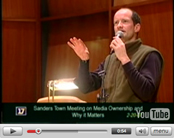Discuss E-List
Essential Resources Guide
FREE Teaching Resources
Membership Benefits
Partner Discounts
Summit 2006
THE WAY WE GET BY: The most moving film of 2009
The Big Picture Theater, Valley Futures Network, the Bluehouse Group, ACME’s Vermont chapter, and Vermont Commons news journal are co-sponsoring a Thursday, July 16 screening of this film at 7:30 p.m. at the Big Picture Theater. Tickets are $7.00 each / $20 for a family of three or more.
Every so often, a movie lands on our cultural landscape with quiet, concussive force – shattering stereotypes, pushing us in unexpected emotional directions, and changing the way we think and feel about this collective project called “reality.”
The Way We Get By is such a film.
Directed by newcomer Aron Gaudet, produced by Gita Pullapilly, and honored with the Special Jury Prize at the South by Southwest film festival last spring, The Way We Get By is easily the most moving film I have seen this year, and indeed, one of the most powerful documentaries I’ve experienced in a long time.
And it is an experience.
Gaudet’s movie revolves around the lives of three elderly “troop greeters” – men and women who have established a network of volunteers who show up at Maine’s Bangor International Airport at all hours of the day or night. The “troop greeters” have one simple purpose. They come to the airport to meet U.S. troops on their way in and out of the United States to Iraq, Afghanistan, and other overseas destinations - administering handshakes, hugs, well wishes, and handing out mobile phones for soldiers to make free calls to loved ones. Because of its strategic location and weather patterns, the Bangor Airport sees more U.S. troops passing through its terminal than any other in the United States. The “troop greeters” even keep a running tally of the number of planes and individual troops who have come through since the U.S. government began prosecuting the “global war on terror” in 2001.
As The Way We Get By unfolds, we meet and get to know our three “troop greeters” in very personal ways. 87-year-old Bill Knight is a World War II veteran battling cancer and drowning in debt – his commitment as a “troop greeter” stems from a deep understanding of what a personal greetings means to a soldier departing or arriving from combat. Joan Gaudet, age 75, has raised eight children (including her son Aron, the film’s director) and endured three knee operations. Now, living alone in an empty nest, she struggles to overcome her fear of going out in the dark to greet the soldiers, and must come to terms with saying good-bye to her 30-year-old daughter Amy, a Blackhawk helicopter pilot who has been deployed to Iraq. 74-year-old Jerry Mundy, meanwhile, grapples with the tragic death of his son and emerging heart issues, while faithfully making regular journeys to the airport with his dog, Mr. Flannigan, to “put a smile on each soldier’s face,” as he says.
The film’s genius lies in the way in which Gaudet orchestrates a quiet build-up of emotions, as well as the deftness with which the film touches on a wide range of themes without making any overt judgments: U.S. military policy and service, patriotism, aging, mortality, family, civic responsibility, and volunteerism all blend together in a subtle but remarkably powerful way. And the film raised deeper questions about the U.S.’s role in the 21st century world at a time when American citizens are feeling so much economic pain. For me, it was not a stretch to draw parallels between the lives of our three main volunteer heroes, and the story of the United States itself, at a time when the world’s richest and most powerful nation is at a significant crossroads.
Whatever your politics, or age, or gender – see this film. It will touch you in a way few films do.
And remember, as the film reminds us:
Sometimes all it takes is a handshake to change a life.



![View your cart items []](/sites/default/modules/ecommerce/cart/images/cart_empty.png)





